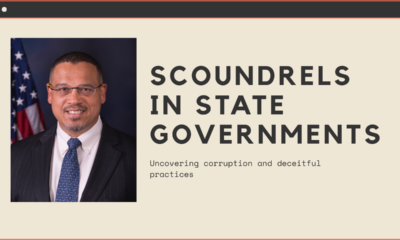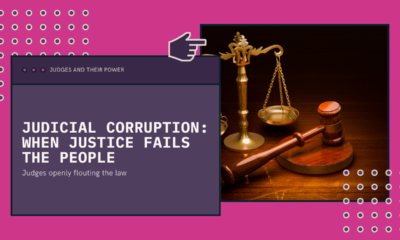Constitution
Abortion and the forgotten person
Senator Feinstein, at the Amy Coney Barrett hearing, once again defended abortion while forgetting the other person involved: the unborn child.

Day Two of the Amy Coney Barrett confirmation hearings began this morning at 9:00 a.m. ET. About the masterful performance by Senator Lindsey Graham (R-S.C.), others will no doubt wax eloquent. Today CNAV needs to discuss one particularly egregious, and execrable, aspect of the performance of the ranking member of the Senate Judiciary Committee.
Abortion and other forgotten-person matters
Senator Dianne Feinstein (D-Calif.), who at least has the good grace to show up (unlike her colleague Kamala Harris, who cowers in her video conference room and seems to imply that these hearings will kill everyone taking part in them with The Contagion That Shall Remain Nameless), proceeded to try to ask Judge Barrett to violate judicial canon. A judge does not tell anyone how he will decide a case that will or might come before his court. But Senator Feinstein did worse. She sketched out a scenario about abortion, and forgot totally about the other person in any abortion transaction. That person is the unborn child.
Not only did Senator Feinstein forget the unborn child. She also forgot the poor slob taxpayer now carrying the bricks for someone who doesn’t take care of himself. Likewise she forgot the law-abiding citizen who, knowing that the police never arrive in time to stop a crime, wants the means to stop said crime by himself. Which means is: a firearm.
We all know what Dianne Feinstein really wants to do about guns in America. She said so herself:
And one could expect her to defend the “Patient Protection and Affordable Care Act.” After all, she represents California, first half of the case California v. Texas. CNAV discussed that case at length yesterday.
But today she gave the worst possible defense of abortion. And likely doesn’t even realize just how badly she bungled that defense.
How not to defend abortion
To be specific, Senator Feinstein talked about, not what she experienced, but what she says she witnessed while attending college. She spoke of women falling pregnant in an era when most States forbade abortion. The penalties generally fell on the practitioner, who could lose his license to practice medicine. So sensitive did the people treat the concept that Hollywood scriptwriters did not even use the word. Instead they spoke of “illegal operations.”1
One can best summarize Senator Feinstein’s remarks this way:
Women rely on the freedom to choose abortion. How dare you or the late Scalia J or anyone else vote to take that away? Ginsburg J assured us that the Constitution absolutely protected the right to abortion. Why will you not say the same?
If Ginsburg J said that, then she violated not only judicial canon but her own policy in confirmation hearings: no hints, no forecasts, no previews. Therefore it ill befits a Senator to ask another judicial candidate to commit the same or similar canonical violation.
About stare decisis and reliance analysis
Laying that aside: reliance analysis does exist, and Judge Barrett touched upon this with Chairman Graham. As these two worthies defined it, reliance analysis tells a judge to consider the effect his ruling will have on others who rely, and have relied, on a law he is about to strike down as unconstitutional.
Professor Timothy Terrell of the Emory University School of Law gave a most eloquent critique of reliance analysis. Writing in the Emory Law Journal, he says:
The supposed benefits of conflating judicial and legislative roles have not been demonstrated to my satisfaction. As I noted earlier, I worry about the relative authority and competencies of judicial versus nonjudicial branches to assess large-scale future “disruption costs.” Here I am emphasizing more fundamentally that speculating about future social costs is not at all the equivalent of analyzing the “rights” of the parties before a court. Judges currently have more than enough to do—and more than enough “Power”—without making the basic doctrine of stare decisis even more controversial.
The problem with abortion – who speaks for the child?
Have a look at that phrase stare decisis, Latin for “to stand as decided.” It means one does not override precedent—meaning an earlier ruling on point—without sufficient reason. Prof. Terrell here resoundingly criticizes the reluctance of judges to admit mistakes, their own or those of their predecessors. In so doing, he rails at a colleague who seems to have blurred the distinction between courts and legislatures.2 “Let judges judge, and legislators legislate!” he seems to say. More to the point: nothing ought to matter to a judge except the rights of the parties before the court.
CNAV observes that this should apply as well to any particular person whom a ruling might affect. The usual way for a judge to consider that is to allow briefs by more than plaintiff and defendant. One submitting such a brief usually has names like:
- Amicus curiae (“friend of the court”),
- Intervenor, and
- Guardian ad litem (to represent a minor child).
But abortion has a unique problem. One person in an abortion case can submit no brief nor retain a lawyer. Again, that person is the unknown child.
What abortion really means – with apologies to Jonathan Swift
During the Irish Potato Famine, Jonathan Swift “modestly proposed”3 to let the poor in Ireland eat their children. This, of course, was satire. Now imagine a similar “modest proposal.” Imagine a particularly evil mother taking a decision to kill her child. A “nosy neighbor” lays information on the murder plot with the police. Who promptly arrest the mother for conspiracy to commit murder, only to see her “make bail.” But then she conceives the perfect way to carry out her plan. She will get a judge to sanction the killing of her child in advance.
So she sues her State seeking injunctive relief to allow her to carry out the murder. She then binds the child hand and foot, drags the child into court, and stands before the judge, knife in hand, ready to carve out the child’s heart. And proceeds to tell the judge that the child is more trouble than the child is worth. (Never mind the details. CNAV expresses confidence that a producer of motion pictures for, say, the Lifetime Movie Network can easily fill those in.) At the defense table sits the Assistant District Attorney who now represents the police.
The judge, openly shuddering and close to screaming imprecations, dismisses the case summarily. So then the mother appeals the decision, saying that the trial court erred in refusing to hear her considerations. And while the child remains a miserable prisoner, the case winds its way to the United States Supreme Court.
A Swiftian Roe decision – and its aftermath
And by a vote of seven to two, the Supreme Court remands the case for re-trial on the merits of the mother’s lawsuit. And in so remanding, sets a standard of “inconvenience” by reason of which a mother may murder her child.
That, ladies and gentlemen, is the essence of Roe v. Wade. Moreover, Senator Feinstein would have the American people respect this kind of precedent.That it did not result in an actual abortion is only because Norma McCorvey, the original plaintiff, carried the child to term while the case wound its way to the high court. But that decision set the stage for sixty million murders since then.
Now let us fast-forward about forty-eight years. A modern District Attorney says, “No more! We will no longer allow mothers to kill their children out of hand!” So he orders the arrest of the next mother to attempt to kill her child by reason of inconvenience. Naturally she appeals her prosecution, citing the earlier precedent. That case might at any time come before the Supreme Court. That is what abortion is all about, and what the Roe controversy is all about.
Where stands Senator Feinstein, after defending abortion so callously?
What kind of defense has Senator Feinstein just made for “precedent”? Would she dare question Judge Barrett as insultingly as she has just done, if the life of a living, breathing child hung in the judicial, Justicial, and Senatorial balance? One would certainly hope not! Yet because such a child has not been born yet, she does so with impunity. And at the time of typing, her fellow Senators have chosen to follow her lead.
Let no one mistake your editor’s position. Abortion is murder. CNAV’s opposition goes further than asking by what right the government takes any person’s hard-earned substance, and hires a contract killer to dispose of an “inconvenient” life. The law ought never allow abortion. CNAV cannot sympathize with the “girls taking trips to Mexico.” That’s like letting them carry their children kicking and screaming across the border, where leering, knife-wielding professional child killers wait.
Other, equally fraught Constitutional controversies
Others (like the Virginia Civil Defense League and the National Rifle Association) can more eloquently defend the Second Amendment. Here let it suffice that Senator Feinstein wants to repeal that. Lacking the votes, she wants the Supreme Court to repeal it. Similarly, she wants the Court to, in essence, amend the Constitution to include this text:
The Congress shall have the power to provide for and maintain free hospitals and clinics, and for permanent medical, nursing, and ancillary staff for each, to lay and collect taxes, duties, imposts and excises to finance the same, and to make all laws which shall be necessary and proper for the execution of this power.
The case California v. Texas hinges in large part on whether the Constitution so states—or not.
But abortion remains at the height of concern in today’s hearings. The judiciary, and the Congress, have given entirely too short a shrift to what abortion means. CNAV recognizes that this hypothetical scenario will shock, appall, and otherwise make people shudder from reading it. (Though not, CNAV expects, those who already understand what abortion really means.) But sometimes one needs to apply just such a shock, and make people shudder just as hard.
It ill befits a Senator…
It ill befits a Senator to endorse murder. And it worse befits a Senator to extort complicity in murder from a judicial candidate.
By throwing the abortion issue into these proceedings, Senator Feinstein showed yet again why she is not fit to sit in the Senate. Neither are some of her current colleagues. The Senate clearly has come to an evil place, when Senators behaving in such a fashion do not face expulsion.
Editor’s Notes
1 See for instance A Fever in the Blood, dir. Vincent Sherman, with Efrem Zimbalist, Jr., Angie Dickinson, Rhodes Reason, Jack Kelly, Don Ameche, Ray Danton, Herbert Marshall, Robert Goulet, et al., Warner Bros. Pictures, 1961. A man on trial for the murder of his wife watches as the investigating policeman testifies that his mistress has tried to arrange an “illegal operation” for herself.
2 The Constitution of Massachusetts enshrines this sort of confusion. It calls the legislature the “General Court” and “court” as one commonly understand it, “Judicial Court.”
3 See Swift J, “A Modest Proposal for Preventing the Children of Poor People in Ireland from Being a Burden to their Parents or Country, and for Making them Beneficial to the Public.”
About the image
Rachel Troyer photographed this display and released her photograph into the public domain.
Terry A. Hurlbut has been a student of politics, philosophy, and science for more than 35 years. He is a graduate of Yale College and has served as a physician-level laboratory administrator in a 250-bed community hospital. He also is a serious student of the Bible, is conversant in its two primary original languages, and has followed the creation-science movement closely since 1993.
-

 Civilization2 days ago
Civilization2 days agoWar lasts forever
-

 Civilization3 days ago
Civilization3 days agoDNI Releases Secret Biden Plan Raising Serious Civil Liberties Concerns
-

 Civilization2 days ago
Civilization2 days agoCanada’s Campaign of Denial
-

 Civilization4 days ago
Civilization4 days agoHarvard Law School Professors Politicize the Rule of Law
-

 Executive4 days ago
Executive4 days agoDems’ Biden Problem: They Broke Him, They Bought Him
-

 Executive3 days ago
Executive3 days agoZeldin Demands Mexico Act on Cross-Border Sewage
-

 Civilization2 days ago
Civilization2 days agoThese Criminal Scoundrels Must Be Brought To Justice – This Includes Your State Scoundrels, As Well
-

 Civilization2 days ago
Civilization2 days agoCanada is Not Satisfying Core U.S. National Security Concerns















[…] has already discussed what abortion really means, and, therefore, what makes it repugnant to the Constitution. Here let […]